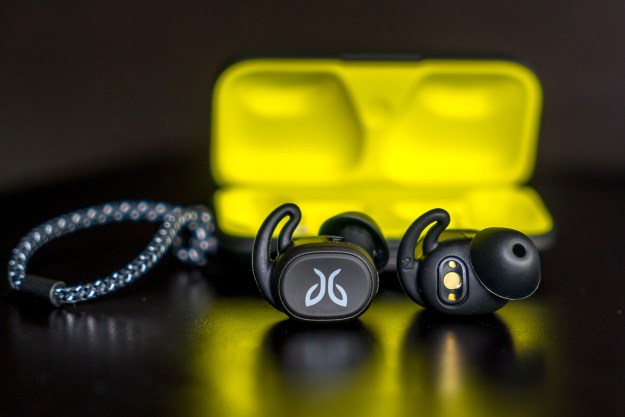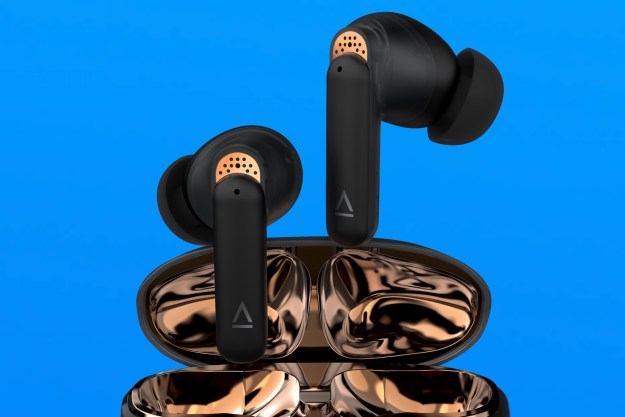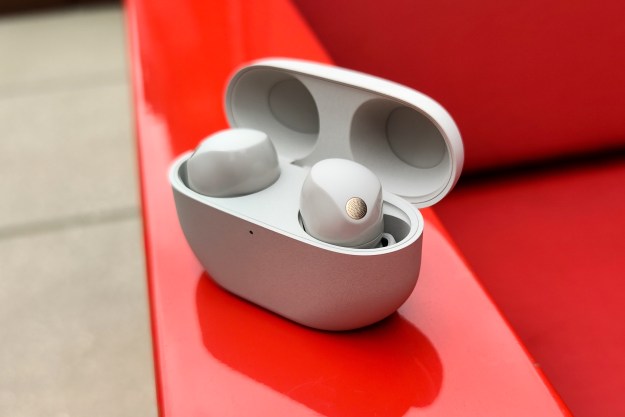
“Jaybird's Vista true wireless earbuds bring a great combo of rugged design and customizable sound.”
- Small and comfortable
- Sweat and water-resistance
- Good sound quality
- Great app support
- Case is the right size
- Sync issues with video
- Battery life is OK at best
- Pricey compared to competitors
Jaybird has been here before. Having tried twice to strike gold with its Run and Run XT true wireless earbuds, the company is hoping third time’s a charm with the new Vista. Changing the moniker is one thing, but being relevant in an increasingly crowded cord-free space meant going back to the drawing board to try something different.
Without a doubt, the Vista aren’t going to find themselves on a budget rack, though the array of features, rugged build, and audio performance make a solid case for Jaybird to be taken seriously this time around.
Fit and Finish
Jaybird stuck to its guns in targeting athletes and active users who like to sweat. It’s been a brand staple for some time, and Jaybird has refined its approach. For example, the rubberized surface that gives it better grip is complemented by a lightweight build that sees each earbud coming in at a mere 6 grams.
Jaybird figures that if the earbuds fit snugly in your ears, then the tips should nestle right in.
Jaybird tried catering to a wider demand for fit and comfort by including three different sizes of ear tips and fins. The difference is that the two come in a single piece, and it’s not what I would call a conventional set, either. Two have fins (large and small), whereas the third doesn’t. All three have the same size silicone tips, which is perhaps the most unusual part out of the box.
I quickly realized the small form factor made up for that. Jaybird figures that if the earbuds fit snugly in your ears, then the tips should nestle right in. That was certainly the case for me, and I can see that being true for people with either larger or smaller ears.
The Vista come with an IPX7 rating for water- and sweat-resistance, letting you submerge them in one meter of fresh water for up to 30 minutes. Apple’s AirPods offer no resistance. Jaybird’s ruggedness is competitive with other brands offering the same, like Jabra and PowerBeats.
Features and Controls
As for the case, it lies somewhere in the middle of size and utility. Though small enough to slip into most pockets, you can also hook it to a bag or clothing with the included lanyard. The case adds an extra 10 hours of audio playback per charge to back up the six Jaybird claims the Vista manages, though as I’ll explain later, that’s a relative number in practice.
Pairing the Vista was easy, as they immediately went into pairing mode once I opened up the case. They were quick in connecting each time out thereafter, with a clear voice confirming and noting the battery level.
Making earbuds this small and nimble forced Jaybird to try being pragmatic when it came to controls. A simple press on either earbud plays/pauses music or accepts an incoming phone call. A double-click on either side skips a track. Press and hold turns them off.

These are the default controls, with custom setups available via the MyJaybird app on iOS or Android. Here, I could set it so that double-clicking the left earbud went to the previous track, or use a single press to bring up Google Assistant. I liked the custom options that integrated with Spotify, letting me press to play a favorite playlist, among other choices. The one catch is that you have to sign up for a free Jaybird account to access those features.
What about volume? Surprisingly, Jaybird never added those controls to the default settings, and the only option was to assign press and hold to raise volume (on the right earbud) or lower it (on the left). It’s not a great setup. I inevitably pressed the buds into my ear canal to avoid pausing, or worse yet, inadvertently hanging up on a phone call.
Tuning and Customization
Jaybird’s community is active, so you’ll find custom EQ presets abound. I quickly added to the default ones laid out from the start. It didn’t take long before I moved on from the initial menu and went for user-created presets. They’re assembled in about a dozen different genres, plus those that are new, trending, popular, or picks from Jaybird’s own staff.
There is a preset for virtually anything you want to listen to.
Jaybird may not be alone in offering custom EQs on a dedicated headphone app, but the implementation is impressive. There is a preset for almost anything you want to listen to. I presets that included hi-res audio tweaks, all the way down to enhancing voices in podcasts. Many presets have a noticeable effect on how the Vista earbuds sound.
I mentioned Spotify earlier, and that integration digs even deeper in the app. Spotify Premium subscribers can share and add playlists at will, providing a level of activity-based music discovery that isn’t a staple elsewhere.
Sound Quality
The Vista have modest 6mm drivers inside, which I made me skeptical of its omph. However, I came away happy with how punchy and spacious these earbuds sounded every time we put them on.
The sound signature is impressive, though I felt the default “flat” EQ didn’t do the Vista justice. With the right presets, the audio spectrum came alive, and that’s how I chose to test how they sound. When I initially played Your Love is King by Sade, the saxophone was prominent, and some of the bass punched through, yet it wasn’t until I tried a few presets that her vocals and other instruments joined the fun.
The same was true of older tracks, like DeBarge’s Stay With Me or Pink Floyd’s Another Brick in the Wall, which I listened to with radically different presets. I also listened to the same playlist of mixed-genre test tracks with the flat EQ to gauge consistency, but it was hard to go back. The custom options sold me on creating Spotify playlists that fit well with certain presets.

Despite the custom features, the Vista have no option to allow outside noise to seep in electronically, like some others do. It’s an odd omission. Passive noise isolation is excellent, which ultimately helps everything sound better, but an elective method to let outside sounds seep in would’ve been a wise choice. We figure the Vista’s smaller size is a direct consequence of not adding features like that in.
The one workaround was to use one earbud in certain cases, like a phone call, where we could hear ourselves talk in the conversation. Since the Vista earbuds pair independently, you can always turn one off and use the other.
Jaybird also has work to do in improving audio syncing with video. Netflix and Prime Video were okay, whereas YouTube, Vevo, Tubi and NHL Live always lagged enough for to notice. If there was a saving grace on the connectivity side, it’s that the Vista rarely ever dropped the connection. When it did, it was very brief, but I was pleased to find this didn’t happen regularly.
Battery Life
Six hours per charge is good for any pair of true wireless earbuds, though some competitors, like the Klipsch T5, crack seven hours. The numbers are approximations, largely based on listening at the default volume. Since that was rarely ever the case when I fired up the Vista earbuds, I wasn’t shocked to see that number fall.
They usually tapped out at around 4.5 hours per charge, sometimes more if I lowered the volume in quieter confines. The case delivers about a full charge and a half over and above that. Jaybird wisely went with USB-C and Quick Charge functionality on the case to stay current. With a five-minute charge, I was able to squeeze out close to an hour at the 60% volume I tested.
Our Take
Sometimes, you buy a pair of headphones and are limited in how you can tailor their sound. That’s far from the case here, and the app experience is bolstered by default audio quality that offers a solid foundation. Their ruggedness and small form factor make them easier to trust in active and sweaty situations, which is not always the case with others in the category.
Is there a better alternative?
The Jabra Elite 75t is the latest in what has been one of the best true wireless earbud lineups to date. Even the previous Elite Active 65t earbuds are still available at about the same price as the Vista. The JLab Epic Air Sport offer a rugged design with tons of battery life, except that comes courtesy of a case that looks monstrous next to the Vista’s.
If audio quality is a factor, the Beats Powerbeats Pro deliver plenty of bass, albeit while catering more to iOS users and suffering from connectivity issues. Sony’s WF-1000xM3 and the Sennheiser Momentum are geared toward premium audio performance, with both coming in more expensive than what Jaybird has here.
The market for good true wireless options continues to grow amid the number of solid performers out there.
How long will it last?
Frankly, Jaybird designed these to take a proverbial beating, so good stewardship should go a long way. Regular cleaning to wipe away excess perspiration and the salt it leaves behind is one surefire way to keep the Vista alive. The rugged and lightweight build can handle a regular workout or run routine, so expect these to last a long while — if you take care of them.
The battery will degrade over time, but we think you have a few good years to work with. That Jaybird also updated the Vista’s firmware twice while we tested them is an indication the company is taking performance and execution seriously. Hopefully, that carries on throughout their life cycle.
Should you buy it?
Yes. The extra care taken to make the Vista small, light, and rugged is a plus when compared to competitors, and the available custom EQ features tailor the listening experience to whatever you feel sounds best.
Editors' Recommendations
- Sennheiser debuts new ergonomically shaped wireless earbuds
- Best wireless earbuds for 2024: Sony, Bose, Soundcore, and more
- Raycon launches $149 Everyday Pro wireless earbuds and headphones
- Wireless earbuds case won’t charge wirelessly? Try this fix
- The best waterproof wireless earbuds for 2023




